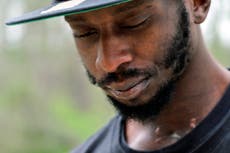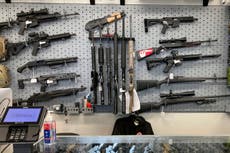Grieving families of shooting victims arrive on Senate’s doorstep to demand assault weapons ban
Families of Uvalde and Parkland shooting victims say sadness is turning in to anger

As a major piece of gun control legislation looks poised to die in the Senate for the umpteenth time, a group of grieving families is turning pain into action.
On a breezy Tuesday morning in Washington, the families erected a small collection of lawnchairs and a small tent roof, and unfurled banners and shirts with a simple message: Ban assault weapons.
Their push for Congress to make meaningful changes to America’s culture of guns and the nightmarish shooting attacks that make the US stand out among its Western peers is nothing new. What’s new is their anger, and perhaps an acceptance of the idea that many in Congress are simply not interested in working to find a solution.
That’s the sense that you get when you talk to Samuel Schwartz, a volunteer with the survivors, who pointed out that some among the families gathered in small circles under the trees had been a part of this movement for more than a decade. Some lost loved ones in the horrific Uvalde elementary attack, others had even more recent experiences in Nashville and Highland Park, and still others came to Washington from Parkland and other scenes of mass violence.
“A sit-in is something that I feel like is done when we have exhausted all our other options,” Mr Schwartz told The Independent. “The fact that we still have to come out here and do this 20 years later is shameful...The senators are doing nothing. Not saving any lives.”
Mr Schwartz, whose cousin was killed in the Parkland massacre, and his allies hope to press a number of Democratic holdouts into supporting the assault weapons ban, even as they understand that getting Republican votes on top of those members is a steep ask. And therein lies the anger: There remains little to be called a path forward, at least through the Senate, for the foreseeable future. That’s a reality that hasn’t changed in a long time.

A bill banning assault weapons passed the Democratic-controlled House of Representatives last year. It hasn’t gone anywhere in the upper chamber, however, and leaders of the president’s party are doing little to champion the issue beyond press releases and the occasional public statement.
“We're going to say nothing during this event that hasn't been said before. What we're doing differently is actually sitting here and not leaving until we do something that's different,” Mr Schwartz said.

His group, which numbered at least 30 on day one, plans to grow and encourage others to join them as their protest persists throughout the week. Volunteers plan to stay on-site “23 hours a day”.
Mr Schwartz described what it was like to be fighting alongside families and survivors who had been pressing for these changes for more than a decade, and how that reality was changing the tone of the movement itself.
“It's like monotonous. Sometimes it feels discouraging. And it's like, you just get in your own head that nothing will ever change.”
He went on to say: “Maybe five to 10 years ago, when Americans heard about a mass shooting, their initial reaction was sadness. Now that has changed, to their initial reaction being anger.
“I feel like anger leads to just movement and momentum. So I mean, we're all angry or peaceful, obviously, but we're pissed.”
Join our commenting forum
Join thought-provoking conversations, follow other Independent readers and see their replies
Comments




Bookmark popover
Removed from bookmarks